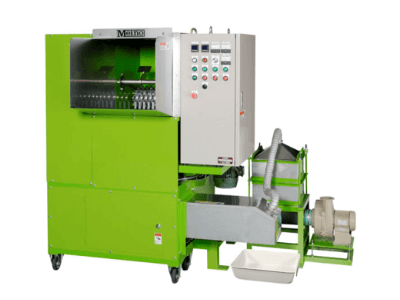What Is an Expanded Polystyrene (EPS) Densifier?

An expanded polystyrene (EPS) densifier is a device that melts styrene foam to reduce its original volume using an on-board heat source without using fire or solvents.
Since styrene foam is melted without using flames or solvents, carbon monoxide from incomplete combustion and harmful gases generated from solvents are not generated, and styrene foam can be melted safely.
In addition, when styrene foam is dissolved by high-temperature heat treatment or solvents, it is difficult to recycle due to deterioration caused by heat and solvents. With expanded polystyrene (EPS) densifiers, there is almost no such deterioration, making it possible to recycle.
Uses of Expanded Polystyrene (EPS) Densifiers
Styrofoam is used throughout our daily lives as containers for seafood and agricultural products, cushioning materials, containers for keeping food hot or cold, and as the inner container of cooler boxes and other containers due to its water resistance.
Styrofoam is a mixture of polystyrene and other resins with air bubbles in them, making it lightweight, but its volume is large, and it is very costly to transport styrofoam as waste material in bulk.
Expanded polystyrene (EPS) densifiers can significantly reduce transportation costs by reducing the volume of styrene foam, and since styrene foam is dissolved at a lower temperature than when it is burned, it can be recycled.
Principle of Expanded Polystyrene (EPS) Densifiers
The main treatment process with expanded polystyrene (EPS) densifiers consists of three steps: crushing, dissolving, and cooling and forming.
First, the styrene foam to be processed is crushed into small pieces by a built-in crusher. In this way, the styrofoam can be dissolved more efficiently.
The crushed styrofoam is then dissolved at relatively low temperatures (~140 degrees Celsius) by frictional heat generated by electric heaters and rotating specially shaped disks, or by warm water, which removes air from the styrofoam. With the air removed, the styrofoam is reduced in size by up to 1/100th of its original volume.
The melted de-foamed resin is then formed into bars or ingots. This shape allows the treated styrofoam to be stored without taking up too much space.
The average size expanded polystyrene (EPS) densifier can process about 40 to 50 kg of styrene foam per hour, and its power consumption can be reduced to about one-fourth that of conventional heat and solvent treatment, making it an extremely energy-saving and environmentally friendly solution.